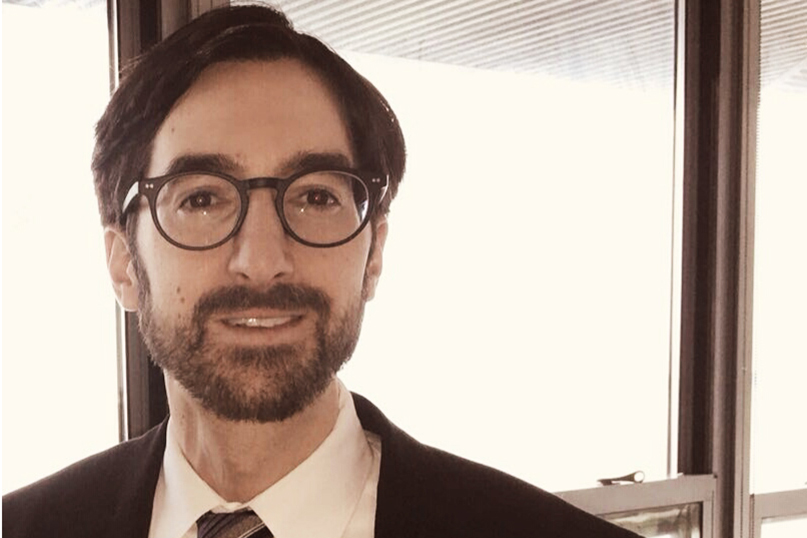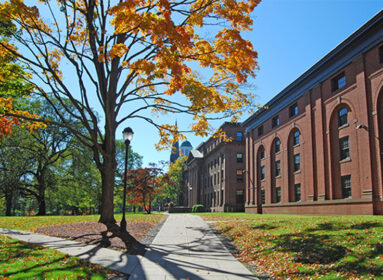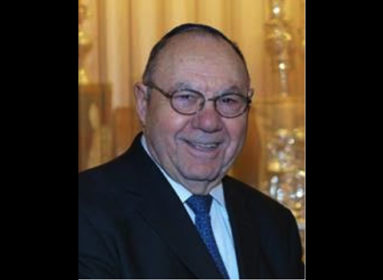
By Stacey Dresner
SPRINGFIELD, Mass. In Rabbi Daniel Ross Goodman’s first novel, A Single Life, the protagonist, Eli, desperately wants to find a frum (Orthodox) wife. His friends try unsuccessfully to make a shidduch (a match) – and Eli fears he may always be a bachelor. Eli’s quest for love and his questioning of religion and relationships take him from a Baltimore yeshiva to a Jewish high school in West Hartford where he becomes a Judaic studies teacher. Once there, Eli indulges his love of secular literature and develops a crush on a co-worker – an English teacher who is a lapsed Catholic.
Oy!
A Single Life, published by KTAV Publishing House in August, is not an autobiography, but a few bits and pieces might have been pulled from Goodman’s life.
Born in Springfield, Massachusetts and raised in Longmeadow, Goodman, 35, grew up in a Conservative home with his father, Alan Goodman, a personal injury attorney, and his mother, Joan Freedman Goodman, a former television news anchor, now director of lay leadership at the Jewish Theological Seminary.
His maternal grandfather, Frank Freedman was Springfield’s first and only Jewish mayor in the 1960s. His maternal grandmother, Eleanor (Labinger) Freedman grew up on Craigmoor Road in West Hartford.
One of his favorite memories of childhood is going to The Crown Market as a child.
“I went to the Crown a lot. It has been a staple of my childhood and my life up until this day,” Goodman said of West Hartford’s kosher market. “My dad’s getting ready for the holidays here in Springfield and we’ll take a trip down to the Crown and pick up stuff. My grandmother was going to the Crown into her 80s, right up until she was unable to drive anymore.”
Goodman attended Heritage Academy in Longmeadow; then for one year attended the Hebrew High School of New England in West Hartford (now New England Jewish Academy). He then decided he wanted a more religious education and began attended Manhattan Talmudic Academy, the Yeshiva University High School for Boys. He later went to Yeshivat Chovevei Torah Rabbinical School, where he was ordained in 2016.
Along the way he also received a law degree; currently he is a PhD candidate at the Jewish Theological Seminary.
Goodman spoke to the Jewish Ledger and about his novel and his own single life.
JEWISH LEDGER: Can you tell us about your Jewish education in Springfield and West Hartford?
RABBI DANIEL GOODMAN: We had a great day school in Springfield, Heritage Academy. It was really fabulous, and I got a wonderful education, both secular and Judaic. In ninth grade I went to what was then the Hebrew High School of New England (HHNE). In my book, the high school in West Hartford is modeled a little bit on that school. I didn’t graduate from HHNE; I transferred in the tenth grade to MTA, which is the Yeshiva University High School for Boys. Tthat’s where my yeshiva background really started to come in.
JL: Why did you switch to MTA?
DG: I loved my friends [at HHNE] and I loved the area, but … I grew up in a Conservative household. By the time I was about 14, I was really craving something very frum. I had a lot of conversations with my parents about really wanting to go to yeshiva.They found the Yeshiva University High School, both a yeshiva and high school. And that worked out really well.
JL: Did you want to be a rabbi back then?
DG: I remember my first grade teacher at Heritage said I was rabbi material. I remember other people saying “You would make a good professor.” And I’ve always been attracted to study. I’m studious, that’s just who I am.
It’s manifested itself in different ways and different directions at different times of my life. During high school, when I was in my very frum years, I just studied mostly Gemara, Talmud, Jewish texts as often as I could. I really wanted to be a yeshiva rebbe, and that’s what I thought I was going to be when I was in yeshiva high school.
That started to change a little bit when I went on to YU and I started reviving my interest in secular studies again in history and literature. At that point I was thinking I would really like to teach, whether in high school or in college, but I knew that to teach in college I would need to get a PhD.
My father really wanted me to go to law school. So I went to law school at Western New England – the same law school my father went to. I passed the bar and worked for a small independent copyright, trademark law firm in New York, but quickly realized that that was not for me.
That’s when I found out about Yeshivat Chovevei Torah rabbinical school. That was a really great experience too. But I still felt like that wasn’t exactly…where I needed to be. I didn’t want to be a pulpit rabbi and I didn’t want to be a rabbi in a high school. I really needed to be in a college setting. I applied to graduate programs and the Jewish Theological Seminary seemed like the best option. I started a fellowship for a doctoral program in Modern Jewish Thought and Theology. I’m going into my fifth year; it should be my last year.
JL: What made you decide to write a novel?
DG: I started to write fiction and publish short stories about five years ago now. I had never written fiction before… The novel came originally from an idea for a short story, but I realized that I couldn’t confine it to a short story alone, this was much more expansive than any work of fiction I had written so far.
JL: Does A Single Life reflect your own experiences as a single person?
DG: Yes, in many ways. For me, the stakes in dating are so much higher when you are religious and the only reason you’re dating is to find a marriage partner. And if you think that you have found the one or you have found a person that you could see yourself with, the emotions become so much more fraught. “Will she correspond with me? How come she hasn’t responded to my emails or texts for three days?”
JL: What would you say is the book’s genre?
DG: It is working within the romance tradition in a literary way, not like a mass-market romance you would pick up at the drugstore. More like Flaubert or Tolstoy literary romances, but also bringing in the traditions of the Jewish novel – Sholom Aleichem – and Jewish writers I studied at JTS like Henry Roth and Philip Roth and that whole tradition.
JL: Who do you see as the audience for this book?
DG: As I was writing the novel and working with the character and the way that the characters speak, it eventually became evident to me that even though I would like to have the novel read by as wide an audience as possible; the readers who will probably most appreciate this are Jewish readers with a bit of Jewish knowledge, maybe a little knowledge of Yiddish or Hebrew or both. But I put the footnotes in there so that I could make it accessible for people who do not have that knowledge.
JL: Where are you at religiously today?
DG: I do not like denominational labels. I go to Orthodox synagogues and I have an Orthodox rabbinic ordination, but I would identify as shomer mitzvoth, which literally means “one who observes the commandments” (i.e., an observant Jew). That’s what I primarily identify as, because it is a more traditional label than the newly invented 19th century terms like “Conservative, Orthodox, Reform.”
JL: The protagonist questions life and love. Do you think the book will speak to Orthodox Jews who may have some of those same questions?
DG: I think it might resonate with certain people in the frum world who do think more and question more, and who may keep these questions and curiosities and conflicts to themselves. The book does depict frum characters like the girl Reena, who questions it enough that she goes off the derekh – off the path – and people of the religious Christian world, like Emma, who questioned it and left.
Eli never contemplates leaving religious observance. It’s more about how is he going to deal with this romantic situation in the context of his religious observance and if it would be workable for him.
JL: Are you planning a sequel?
DG: I will never say never… but as of now, I have no intent to write a sequel. I will finish graduate school in May and then want to teach in a college or university. At the same time I would love to continue writing fiction and working on my second novel. My publishers were very pleased with this novel, and they invited me to do a second novel, so that’s in the works. I would really like to continue doing both.








 Southern New England Jewish Ledger
Southern New England Jewish Ledger









